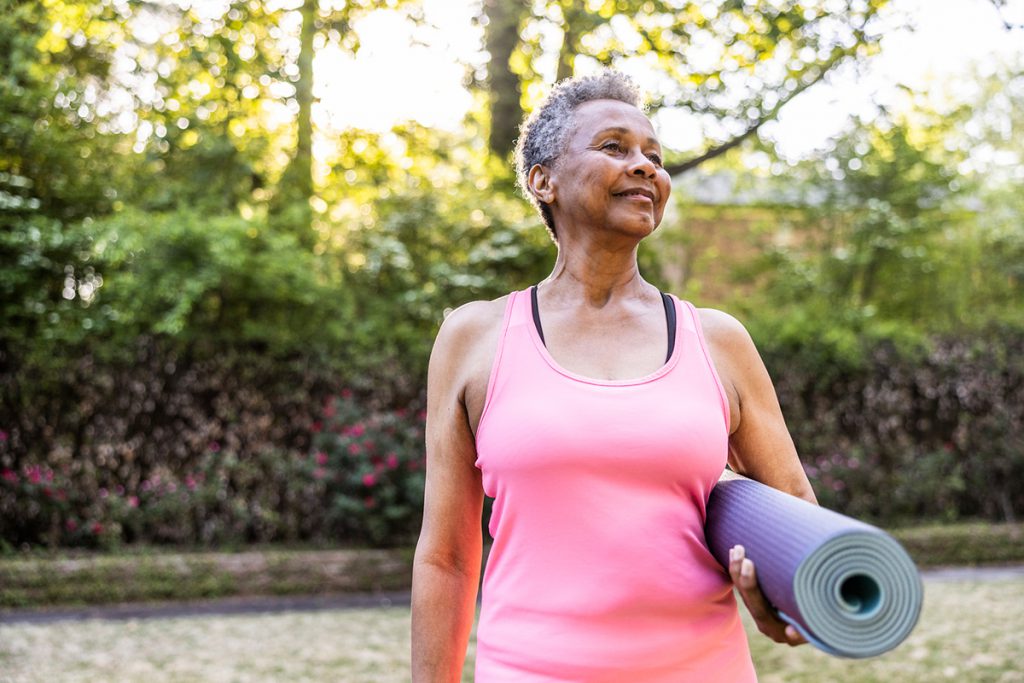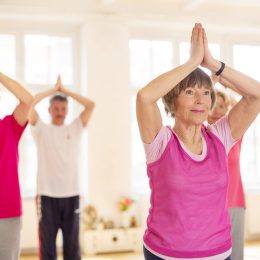What Is Yoga Therapy, and Should You Try It?
This unique form of yoga may help you heal that injured knee, address anxiety, or work through other physical and mental challenges.

You may already practice yoga to reduce stress, increase concentration and improve physical balance. But did you know there is a distinct form of yoga that can help you with your unique physical and mental challenges?
This type of yoga – called yoga therapy – adapts yoga’s tools (postures, breathing techniques, meditations and mantra) to suit individual needs. Yoga therapy instructors have extensive training and will customize a session for each practitioner to help you reach your health and well-being goals.
How Is Yoga Therapy Different from Yoga?
For many people, especially in the U.S., yoga is considered exercise. Yoga therapy is a complementary and alternative therapy that studies show may help address and manage a range of conditions, according to the Cleveland Clinic.
These conditions include:
- Joint pain
- Back pain
- Headaches
- Depression
- Anxiety
- Sleep issues
- Menopause symptoms
- Addiction
- Weight loss
- Cancer pain
- Autoimmune disease
- Neurological disorders
- Heart disease
Add SilverSneakers to your wellness routine! Classes and events are happening right now at participating gyms, online through SilverSneakers LIVE, and at community centers near you. Activate your free online account to get started.
How Do I Know if Yoga Therapy Is for Me?
Yoga therapy can help anyone. And it may be a great place to start if you want to try yoga but aren’t sure a regular class will help or hurt your lower back pain, anxiety, or other issue.
“Yoga’s booming popularity has resulted in a wide array of offerings that can be confusing, intimidating and sometimes inappropriate — particularly for older adults and people with health challenges,” says Carol Krucoff, C-IAYT, a yoga therapist at Duke Integrative Medicine Center in Durham, North Carolina, and co-author of Relax into Yoga for Seniors.
Plus, you don’t need yoga experience to do yoga therapy, nor do you need to be flexible, athletic, or have any special physical abilities. That said, if you are new to exercise or have a chronic condition (including osteoporosis or osteoarthritis), balance issues, or are recovering from an injury or surgery, it’s always important to get your doctor’s OK before beginning any new exercise program. Ask them how to exercise safely.
Seniors, people with limited mobility, and those with health challenges — particularly chronic health challenges — often find yoga therapy especially useful, says Krucoff.
Recommended FREE SilverSneakers On-Demand Class: Restorative Yoga, Breathing Exercises for Seniors
What to Expect During Yoga Therapy
As a rule, yoga therapy is a one-on-one experience between you and a yoga therapist. Sometimes you can find group yoga therapy classes for people dealing with the same condition, like breast cancer, for example. Sessions typically range from 30 to 90 minutes.
“Be sure your yoga therapist is experienced, well-trained, and certified by the International Association of Yoga Therapists,” Krucoff says. “Ask if they have specialized training in working with older adults.”
Only certified yoga therapists are permitted to use the initials C-IAYT or IAYT. Yoga therapists have a minimum of 1,000 hours of training. (Yoga instructors have a minimum of 200 hours of training.) You can find a certified yoga therapist using the International Association of Yoga Therapists’ search tool.
During your session, you will:
1. Discuss your health goals. During your initial session, a yoga therapist will have an in-depth conversation with you to understand your health history, concerns and goals. Follow-up sessions revisit how you’re doing.
2. Practice breath work and movement. Your yoga therapist will guide you through simple movements and breath work to measure your strength, flexibility and balance and address your physical and mental health challenges. This also allows the therapist to notice if you have any unhealthy movement patterns that should be addressed.
Subscribe to our newsletter
It's quick and easy. You could be one of the 13 million people who are eligible.
Already a member? Click to discover our 15,000+ participating locations.
Follow Us
3. Get a personalized practice. Your yoga therapist will use what they learned in steps 1 and 2 to create a program that is appropriate for your abilities, health challenges and health goals. They also consider what you do and don’t like and how much time you’re willing to commit to the program at home. Your practice may include postures, breathing techniques, visualization, mantras, and meditation.
4. Get instructions so you can practice at home. You should leave the session with written, audio, or visual references to help you practice at home — a critical part of the program.
There are no hard-and-fast rules regarding how often to see a yoga therapist but expect to have at least a few in-person sessions at the outset so you can establish a habit of practicing the program. After that, you might return occasionally for follow-up sessions, so your yoga therapist can assess your progress and change your program as you and your needs change.
Recommended reading:
Why Yoga Belongs in Your Healthy Aging Plan
The De-Stressing Benefits of Yoga for Older Adults
6 Surprising Health Benefits of Mindfulness
See our sources:
Yoga therapy: International Association of Yoga Therapists
Benefits of yoga: International Journal of Yoga
Yoga and cancer treatment: Support Care Cancer
Medical yoga therapy: Children and Evidence Based Complementary and Alternative Medicine
Activate Your FREE SilverSneakers Online Account
Get hundreds of free SilverSneakers On-Demand videos and stay in touch with us by creating your free online account. You don’t have to be a SilverSneakers member to get on-demand workout videos, health and fitness tips from SilverSneakers, and more.
SilverSneakers members can go to thousands of nationwide gyms and fitness locations, plus take SilverSneakers LIVE online classes led by specially trained instructors and designed for all fitness levels and abilities – at no additional cost. If you have a Medicare Advantage plan, it may include SilverSneakers. Check your eligibility here.
Already a member? Get your SilverSneakers member ID, search for locations near you, and all the health and wellness resources you need by logging in to your online member account here.





